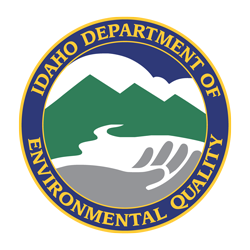Every day, citizens across Idaho take action to reduce their impact on the environment. Learn what you can do to reduce pollution and improve air and water quality.
There are many ways each of us can reduce air pollution, from limiting emissions from driving, using clean fuels for home heating, operating HVAC equipment efficiently, and using electric lawn and garden equipment.
This accordion will not appear on the screen
Woodsmoke is a major source of particulate matter exposure and can contribute to cardiovascular disease, heart attacks, and premature death. Pollution from woodstoves is particularly acute during winter inversions when stagnant air traps smoke in low-lying valleys. However, particulate matter can be significantly minimized by burning right:
- Burn Dry Wood
- Operate Your Stove Properly
- Maintain Your Stove
- Upgrade to an EPA-Certified Stove
- Ensure Your Stove is Professionally Installed
Vehicles emit a variety of pollutants that can impact human health and the environment. Emissions from vehicles can become highly concentrated in loading zones where they can disproportionately affect sensitive populations, including children and the elderly. We work with schools and businesses to encourage drivers to turn their vehicles off instead of idling. We provide signs, stickers, and educational materials to remind drivers to shut off their vehicles when loading or dropping off.
If you would like to participate in the Clean Air Zone Program, contact our pollution prevention coordinator.
Water is an essential natural resource for human health, recreation, agriculture, and industry. Our individual actions can help conserve and protect Idaho’s water resources, including minimizing and properly apply fertilizer and properly maintaining septic systems.
This accordion will not appear on the screen
Fertilizers contain compounds such as nitrate and phosphorous that can degrade ground water quality and impact rivers, lakes, streams, aquifers, and other drinking water sources. These compounds can be transported to surface waters where they can contribute to harmful algal growth. By properly applying fertilizer, you can ensure that ground and surface water resources are protected from contamination.
Properly functioning septic systems are essential for protecting ground water resources. Harmful bacteria from malfunctioning systems can leak into ground water and drinking water sources as well as rivers and lakes, where they can degrade impair aquatic systems and impact human health. Learn how you can properly maintain your septic system.
Residential Hazardous Wastes include unused chemicals or compounds that are toxic, flammable, reactive, or corrosive. You can help minimize the generation of hazardous wastes by selecting nontoxic and less-toxic chemicals.

